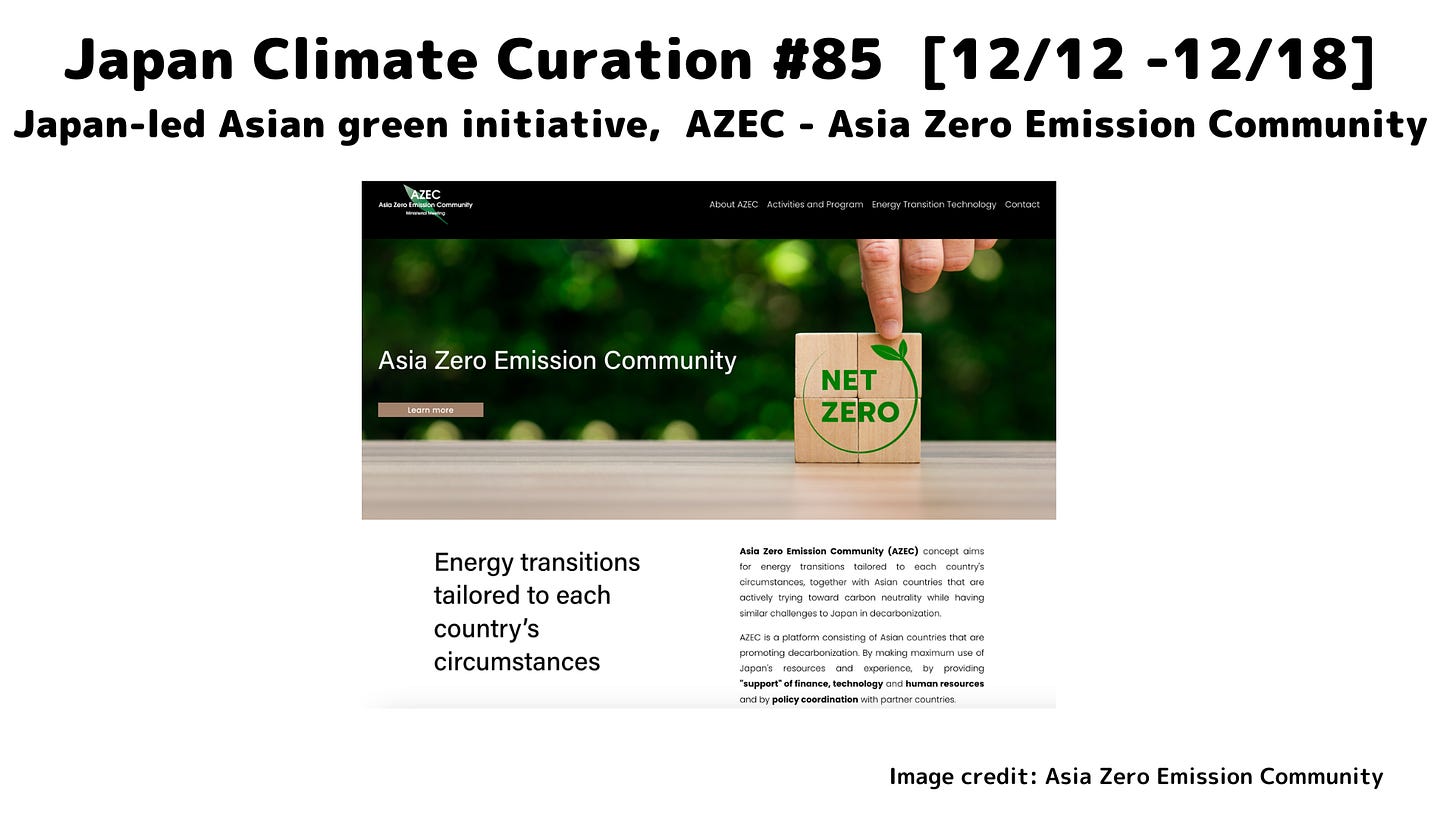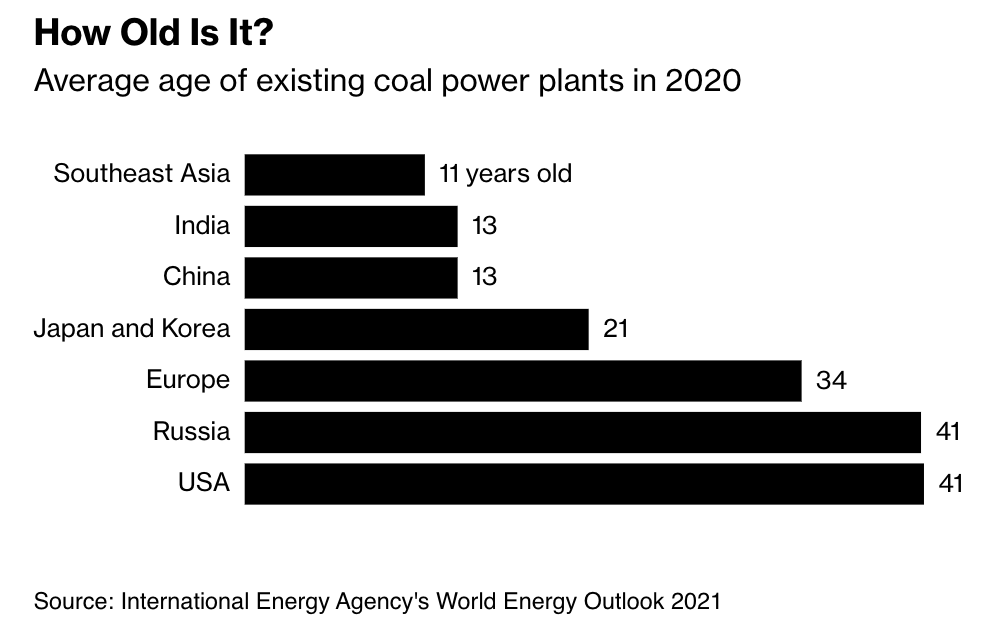*Editor’s note: This article was originally published on 12/19/2023 on Linkedin.
Welcome! I'm Hiroyasu Ichikawa, ichi, and this is issue 85 of "Japan Climate Curation" newsletter📬, which curates Japan-related climate news content every week since spring 2022, with over 210 subscribers [ more than 2,000 on Linedin]. You can subscribe by clicking on the Linkedin page or the form below.
Ten news articles were curated this week, covering Japan-led Asian green initiative - AZEC / Asia Zero Emission Community and more.
I hope you find the articles below beneficial for reading (or skimming)!
*Consulting Service is available for your Japan-related climate or net-zero business. The first 30 minutes of Zoom chat is free, and I could work at an hourly rate starting at $100. Please fill out your request using this link. Thank you!
[🇯🇵📰👀Japan Climate News Headlines]
【1】Japan-led Asian green initiative works to scale up transition finance Leaders from ASEAN and Australia join inaugural AZEC summit for net-zero goals [12/18 Nikkei Asia]
Japan-led Initiative: Japan and ten other Asian countries agreed to promote financial measures for a greener economy at the Asia Zero Emission Community (AZEC) summit in Tokyo.
Transition Finance Focus: Emphasis on "transition finance" to fund energy transitions, with the establishment of the Asia Zero Emission Center for research and policy support.
Decarbonization Challenge: Addressing the challenge of balancing fossil fuel demand and greenhouse gas emission reduction in Southeast Asia, recognizing diverse energy needs and development stages.
*Japan Prime Minister Kishida pledges to lead decarbonization effort in Asia [12/18 NHK World]
【2】Japan Seeks Support for Using Co-Firing Technology in Asia - Critics say climate solution may extend life of coal plants / Co-firing is one method Japan promoted at Asia-Pacific summit [12/18 Bloomberg]
Japan is advocating co-firing technology in Asia-Pacific to reduce emissions, mixing less-polluting ammonia or hydrogen with coal or gas in power plants. This approach, promoted at the Asia Zero Emission Community meeting, aims to assist countries with young coal plants and high energy demands.
Critics, however, argue that co-firing is costly, limited in emission reduction, and may hinder the adoption of zero-emission technologies like solar and wind. Concerns also revolve around the availability of ammonia and hydrogen supplies.
The debate intensifies following the COP28 climate summit's stance on natural gas and the transition away from fossil fuels.
【3】EDITORIAL: World must fully commit if serious about pivoting from fossil fuels [12/18 The Asahi Shimbun]
COP28 ends with a significant agreement on transitioning from fossil fuels. Japan, criticized for inadequate climate action, must enhance its renewable energy initiatives and reconsider its controversial energy strategies. The global shift demands urgent action.
【4】Japan is a cuddlier friend to South-East Asia than America or China Relations between Japan and ASEAN are entering a new era [12/14 The Economist]
Japan is emerging as South-East Asia's most trusted external partner, surpassing America and China in fostering positive relations with ASEAN countries.
Over the last decade, Japan's investment in ASEAN ($198bn) nearly matches that of America ($209bn), focusing on infrastructure, technology, and aid. Japan's approach is marked by consistent engagement and deference, differing from America's and China's more assertive diplomacy.
【5】Japan to invest more than $90 bil. to push decarbonization [12/18 NHK World]
Japan is committing approximately 13 trillion yen (over 90 billion dollars) to accelerate decarbonization in the private sector, primarily through green transformation bonds.
This funding aims to support industries with significant carbon footprints, like steel and chemicals, in transitioning to low-emission technologies. Over 3 billion dollars are allocated for the next five years and 9 billion for the following ten years.
Additionally, the government will subsidize the cost difference between fossil fuels and alternative energy sources, including hydrogen, with an investment of over 3 billion dollars in five years and 21 billion in fifteen years. Other sectors like battery storage, semiconductors, and nuclear power are also targeted for assistance in the fiscal 2024 budget.
【6】Japan's Kansai Electric cancels new LNG-fired power plant Utility to focus on decarbonization as nuclear reactors restart [12/19 Nikkei Asia]
Kansai Electric cancels a major LNG-fired power plant, pivoting towards low-carbon energy. Despite incurring losses from this decision, the company forecasts a significant profit increase, aligning with global decarbonization trends.
【7】Japan's JERA to study ammonia supply to ships with NYK and Resonac [12/13 Reuters]
Japan's leading power generator, JERA, is collaborating with NYK Line and chemical firm Resonac to investigate ammonia as a marine fuel, aiming to diversify its application beyond power generation.
This initiative is part of a broader trend among shipping companies like North Sea Container Line and MOL to explore ammonia for reducing emissions and achieving decarbonization targets.
The study involves supplying ammonia to an ammonia-fueled tugboat developed by NYK Line, set for delivery in June 2024. The focus includes establishing safe handling procedures for ammonia, its transportation to ports, and developing usage regulations as a marine fuel.
【8】JR Central developing train running on hydrogen fuel cells [12/18 NHK World]
Central Japan Railway engineers are developing a hydrogen fuel cell train, a significant advancement in achieving zero carbon dioxide emissions in the railway industry. This technology, demonstrated in Aichi Prefecture, harnesses the chemical reaction between hydrogen fuel and oxygen to generate electricity, emitting only water.
Additionally, the train is powered by storage batteries. This initiative aims to replace diesel-fueled trains, aligning with the broader goal of decarbonizing the railway sector. The recent tests confirm the train's adequate power and acceleration capabilities, marking a crucial step towards sustainable rail transport.
【9】Japan’s unrealised ESG potential Plus, a late-night deal in Brussels [12/15 Financial Times]
Japan's ESG market remains under-tapped, with its government pushing for carbon neutrality by 2050 and offering green subsidies. Investors are yet to fully exploit this, even as the EU tightens sustainability regulations affecting thousands of companies globally.
【10】1.5°C Business Transformation Plan: Navigating the Net-Zero Future with a Roadmap [12/14 Institute for Global Environmental Strategies]
At COP 28's Japan Pavilion, the '1.5°C Business Transformation Plan' emphasizes systemic energy changes and deep GHG emission cuts. The IGES-led '1.5°C Roadmap for Japan' guides businesses and society towards global climate goals, with insights from top industry leaders.
📬That's all for this week! Thank you for reading(or skimming) 🙇. I hope you will have a wonderful week ahead!
*Consulting Service is available for your Japan-related climate or net-zero business. The first 30 minutes of Zoom chat is free, and I could work at an hourly rate starting at $100. Please fill out your request using this link. Thank you!
"Climate Curation" newsletter in 🇯🇵Japanese (every Saturday) is available on Linkedin as well as Substack.
Please feel free to contact me via email: hiroyasu.ichikawa [@]socialcompany.org, if there are any research/consulting needs for your business or just for a coffee chat☕.
My personal Twitter(X) account (in 🇯🇵Japanese) @SocialCompany
ichi (Hiroyasu Ichikawa)





